-
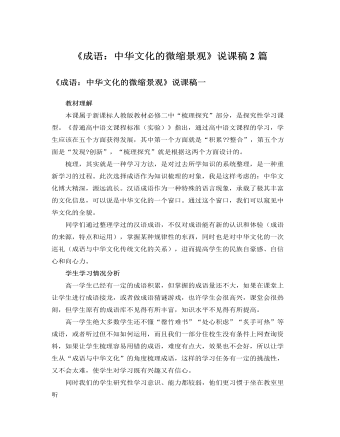
人教版高中语文必修2《赤壁赋》说课稿3篇
[教学反思]人教版高中语文必修二第三单元安排了《兰亭集序》《赤壁赋》《游褒禅山记》三篇古代山水游记散文,它们借游赏之事,探索生命的意义、治学的道理。师者,所以传道、授业、解惑也。高中的教材选用的都是历史经典名篇,每一篇都闪烁着儒道释等百家光辉的思想。编者要老师传道的意图很明显。即非如此,看着这些影响历代、影响世界的如日月之耀眼光华的伟大思想就躺在我们的教科书里,又如何能不讲呢?所以,我将本课的教学重难点拟定为:帮助学生建立积极的生死观,掌握多角度看问题的正确的思想方法。当然,也让学生领会了融写景、抒情、说理于一炉的大家手法。整堂课各教学环节,环环相扣,过渡自然,读、思、议、写训练到位,而且全部围绕“生死观”展开,如一篇形散神不散的散文。
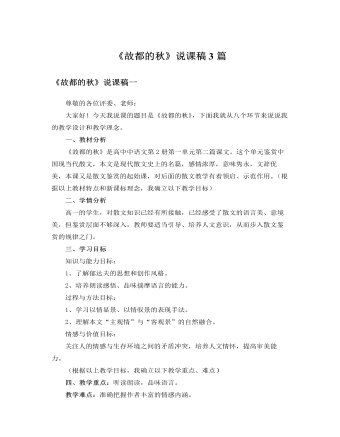
人教版高中语文必修2《故都的秋》说课稿3篇
请一位朗诵水平较好的学生,有感情的朗读课文12自然段,其他同学完成一项任务:这一段可否去掉?为什么?学生思考、圈画、交流、讨论,然后小组发言,其他小组补充,教师从旁予以点拨,引导学生进一步明确作者的思想情感。明确:作者要创造一种文化氛围,于自然气息之外再添一重文化气息,与“故都”题旨暗合。从行文章法上看,这里是宕开文笔,纵横议论,显出深厚的文化底蕴和开阔的思路。这一段采用议论,通过古今中外的引证,说明感秋处处有,中国文人最突出,而秋“深味”非在中国北方莫属,这其实还是为了突出故都之秋。(设计意图:提高学生探究的能力,充分把握本文的教学内容,深刻体悟作者的情感,了解作者对秋的礼赞情感,从而突破教学难点。)
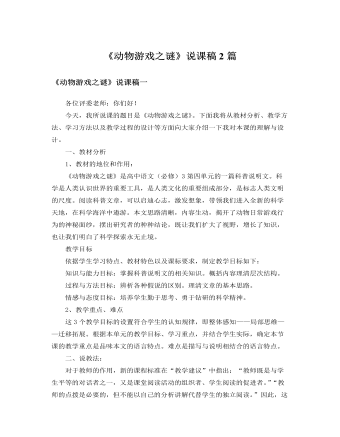
人教版高中语文必修3《动物游戏之谜》说课稿2篇
一、导入新课人类社会越来越现代化,新科学技术日新月异,令人目不暇接,称之到了“知识爆炸”的时代也毫不为过。由此而来的是生活的快节奏,学习和工作的竞争也越来越激烈。这种竞争一直波及到了儿童,加之中国几千年来形成的望子成龙的传统观念,使作父母的把一切希望都寄托在孩子身上,实现自己未能实现的理想。祖孙三代4、2、1的局面,使12只眼睛都盯在了孩子身上,真是走路怕摔着,吃饭怕噎着,干活怕累着,要星星不敢摘月亮,要吃什么跑遍全城也要买来。这种过分保护、溺爱及过早地灌输知识会得到什么结果呢?乐观者说孩子越来越聪明,越来越早熟,将来能更好适应现代化的要求;悲观者则认为豆芽菜式的孩子将来经不起风浪,小皇帝太多了很难凝聚成统一力量,将来谁去当兵,谁去干那些艰苦创业性工作……。对孩子本身来说,是幸福还是……在此不想多发议论,还是让我们来看看动物世界的孩子们吧,也许会得到某种启迪。
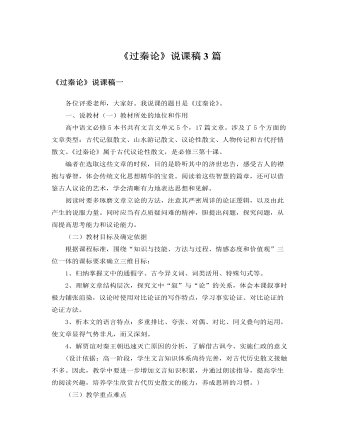
人教版高中语文必修3《过秦论》说课稿3篇
本文篇幅较长,并且有一字句不易理解,因而对高一学生来说完全读懂内容有一些困难。这样的话,老师就要做好引导工作,把一些难点,或是出现词类活用比较多,局势比较特殊的句子,老师可以先给学生画出来,存疑,或是与同学们一起讨论解决。对那些不易懂的字词就引导学生联系上下文提供的语境、前后涉及的情节加以推测、判断,以培养学生依据文脉推断词义的好方法。要求学生点出重点实词、框出通假字,主要是为帮助学生积累和掌握一些文言文中常见的一词多义、异读现象、古今异义和通假现象的词语,并进一步得出规律,指导今后的文言文学习。词类活用和特殊句式在文言文翻译中难度较大,也是本文教学的两大难点。要求学生标出有活用现象的字和划出句式特殊的句子,是基于两点考虑:1、积累一定数量的第一手例句;2、引导学生加以分类,找出每类的相同特征,并抽取出来形成规律性的东西,从而上升到理性认识,使学生能由学会一个到会学多个。翻译过程中注重指导学生养成用符号法表示重点字句的好习惯,如点、框、圈、划线等符号应约定一致,便于突出翻译中的重点、难点及复习。我的提示着重归纳了实词“制”“亡”“遗”“利”等,名词活用、形容词活用、使动用法,被动句、状语后置句。
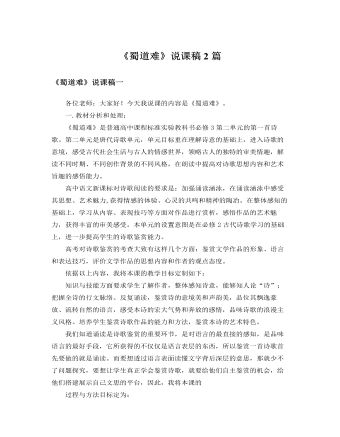
人教版高中语文必修3《蜀道难》说课稿2篇
(1)“问君西游何时还……使人听此凋朱颜。”诗题下未注明送何人入蜀,所以这里的“问君”无妨假定实有其人,可以读得亲切一些。将行而问“何时还”,已有不可行之意,重音要落在“不可攀”三字上,当用劝说的语气读。以下四句借鸟声渲染旅途中悲凉凄清的氛围,读时要放低声调,有干里孤身之感,至“愁空山”徐徐而上。然后用感喟的语调读主旨句,至“凋朱颜”略作一顿,以示意犹未尽。(2)“连峰去天不盈尺……胡为乎来哉!”仍是说不可行,但内容加深了一层,因为说的是蜀道的险恶。前四句不是纯客观的描写,读时须设想这是旅游者攀援于“连峰”“绝壁”之上置身于“飞湍瀑流”之间,要使听者感到惊心动魄。读后可作稍长停顿,再用“其险也如此”缓缓收住。末句是诗人借用蜀人的口气,对历险而来的游者深表叹息——“胡为乎来哉”不是询问,当用降调读,暗含“何苦而来”之意。
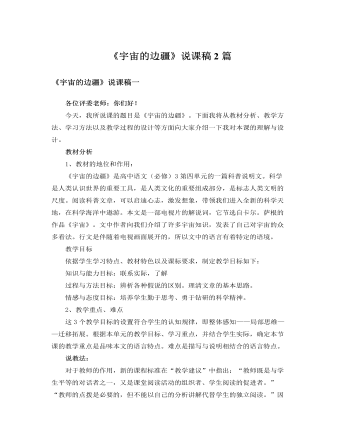
人教版高中语文必修3《宇宙的边疆》说课稿2篇
(有的恒星旋转平稳均衡,有些恒星是因快速旋转而变了形。作者以拟人的手法,生动形象地描述,仿佛向我们展示了不同恒星的性情:有的稳重沉静,有的急切躁动。读来生动有趣,妙趣横生。)(3)我们探索宇宙的时候,既要勇于怀疑,又要富于想象。想象经常能够把我们带领到崭新的世界,没有想象,我们就处处碰壁。怀疑可以使我们摆脱幻想,还可以检验我们的推测。(对于未知领域的探索是需要怀疑和想象的,想象是科学的翅膀,敢于想象,并不断地探索验证,所谓“大胆假设,小心求证”怀疑否定旧知,产生新知。作者以简洁的语言阐述了想象和怀疑看似矛盾的两者在宇宙探索中的相辅相成,和谐统一。作者不囿于介绍宇宙知识,还发表自己的见解。)(4)我认为宇宙里很可能到处都充满着生命,只是我们人类尚未发现而已。我们的探索才刚刚开始。
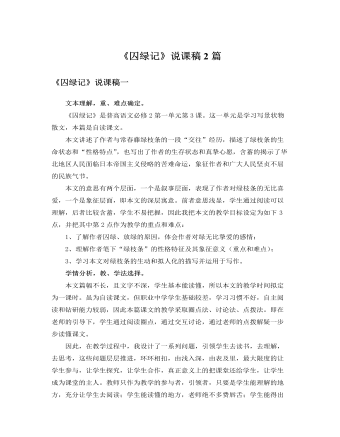
人教版高中语文必修2《囚绿记》说课稿2篇
“深入探究,把握主旨”这一步则是解决教学的重点难点,这里涉及到课文的深层意蕴,学生理解有难度,教师在通过问题引领学生探讨的基础上,还要适时启发、点拨,因为教学时间有限,让学生漫无边际的讨论,可能难以完成预定的教学任务,会使教学过程不完整。至于本文的写作特点的教学视时间而定,有时间可以让学生说一说,没有时间用小黑板出示一下,让学生了解就行,如果时间不够,甚至可以不讲。第三阶段是“延伸练习,巩固提高”。
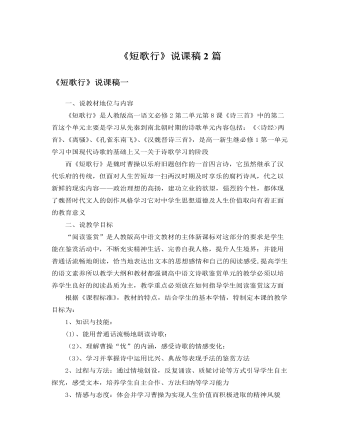
人教版高中语文必修2《短歌行》说课稿2篇
一、说教材《短歌行》是普通高中课程标准实验教科书必修(二)第二单元的一篇略读课文,本单元安排的是先秦到南北朝时期的诗歌。《短歌行》是著名政治家、军事家、文学家曹操的作品。诗中抓住“忧”字来写诗人为什么“忧”,如何解“忧”,从而表达希望能够招揽人才、完成统一天下的雄心壮志。所以本单元安排《短歌行》一诗,对学生全面了解曹操,感受曹操在短暂的人生中竭力创造伟业的气概。二、说学生我这一课的教学对象是高一学生。他们进入高中学习的时间只有三个多月,现在已经完成了必修(一)的学习。学习了现代诗歌单元,有了一定的诗歌学习基础,初步掌握了读诗的基本方法,但是还未能形成成熟的稳定的学习方式。同时,本单元学习是高中第一次接触古代诗歌,诗歌语言上的障碍和时间上的跨度对他们来说都是学习上的困难。因此教师要引导学生自主学习,合作学习,为他们设置新的学习情境,提供合作探究的机会。
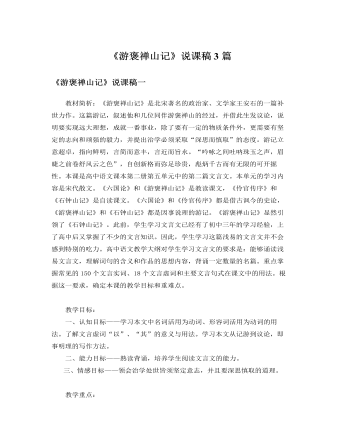
人教版高中语文必修2《游褒禅山记》说课稿3篇
学法指导:高一学生对文言文阅读已具备了一些基础知识和积累,但对如何学习文言文,还是一个新课题,因此教师应引导学生掌握学习方法,运用已有的知识框架同化新信息,建立新的智能,逐步走向独立学习的境界。一、引导学生利用课文注释,使用工具书自己翻译,必要时教师进行点拨、解难,培养自学能力。二、告诉学生翻译文言文要遵循的原则。三、调动学生思考、讨论、交流的积极性,教师适时点拨,培养学生发现问题、解决问题的能力。四、提示学生反复诵读课文,体会文章所阐述的道理。五、鼓励学生及时归纳学习文言文的方法,注意积累文言文知识。教学程序:教学本课可安排2课时。第一课时:1、导入新课:首先给学生介绍毛泽东的七绝诗《为李进同志题所摄庐山仙人洞照》:“暮色苍茫看劲松,乱云飞渡仍从容。天生一个仙人洞,无限风光在险峰。”学生通过诵读领会了“无限风光在险峰”一句的含义。随后因势利导,引出课题,指出今天我们要学习的王安石的《游褒禅山记》,就含有类似的深邃哲理。
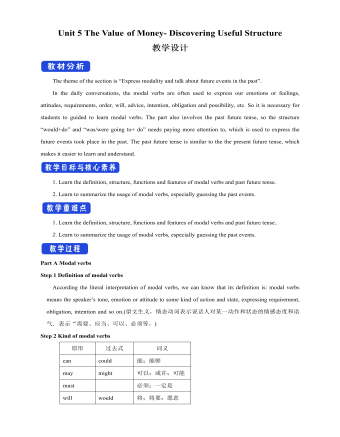
新人教版高中英语必修3Unit 5 The Value of Money- Discovering Useful Structure教学设计
Step 3 Meaning1. 过去将来时表示从过去某一时间来看将要发生的动作或存在的状态, 常用在宾语从句中。一般由“would/should +动词原形”构成。She hoped that they would meet again someday. 她希望将来有一天他们能再见面。2. was/were going to+动词原形: 表示过去将要发生或很有可能发生的动作, 常用于口语中, 表示预言、意图或者打算等。He was going to start work the following week. 他打算下星期开始工作。3. was/were about to do: 常用来表示即将发生的动作, “刚要/正要做……”。注意该结构不与任何时间状语连用。I felt that something terrible was about to happen. 我感到某种可怕的事情即将发生。4.was/were to do: 表示“曾计划做某事”, 如果表示“本来计划做某事, 动作没实现”, 则需用 “was/were to have done”。She said she was to have told me about the accident. 她说她本来想告诉我关于事故的事。5.Start, go, come, leave, see, meet等动词的过去进行时: 表示就过去某一时刻而言即将发生的动作。She was coming later. 她随后就来。I had just put on my overcoat and was leaving to visit a friend of mine. 我刚穿上外套要去看我的一个朋友。
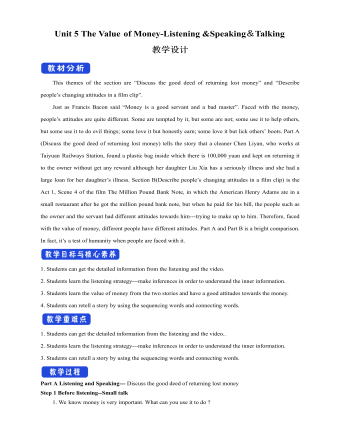
新人教版高中英语必修3Unit 5 The Value of Money-Listening &Speaking&Talking教学设计
4. A:We’d like to have someone to say a word at the beginning to welcome the group.B:↙Who?A:We thought that you or Dr.Johnson might do it.B用降调说Who,其意思是问,对方想让谁在开场时致欢迎词。Step 6 Pronunciation---Practice1. Listen to the short conversation and mark the intonation with ↗, ↙ or ↙, ↗. Then discuss with a partner what they intend to convey by using different intonation.Owner: You know what ?↗ It’s a million-pound bank note↙.Waiter 1: Really ?↗(question)Waiter 2: Really !↙(unbelievable and surprised)Waiter 3: Really ?!↙↗(first question then surprised)2. Listen to the conversations. Underline the parts that are stressed and mark the intonation. Then talk about the implied meanings of the responses with different intonations. Listen again and repeat.1) Henry: It’s a nice suit.Owner: Oh, it’s perfect!↙(The intonation means it is very suitable for Henry.)2) Henry: Well, that’s very kind of you.Owner: Kind, sir ?↗(what you said is not right) No, it’s kind of you. You must come whenever you want and have whatever you like. Just having you sit here is a great honour !!↙(welcome you to come again)3)Henry:Well, to be honest, I have none. Oliver:(happily) What luck!(excited) Brother↗, what luck!↙(It means “Didn’t you hear it?”)Henry: Well, it may seem lucky to you but not to me!↗(angry) If this is your idea of some kind of joke, I don’t think it’s very funny. Now if you’ll excuse me, I ought to be on my way.↙(If so, I would leave.)Roderick: Please don’t go↙...(hope Henry can wait for a moment)Part B Viewing and Talking---Describe people’s changing attitudes in a film clipStep 1 Before-listening---Tell the filmYou are going to watch part of the film The Million Pound Bank Note. Look at these photos and guess what happens in the film.
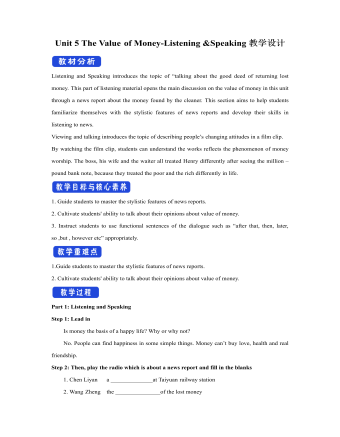
新人教版高中英语必修3Unit 5 The Value of Money-Listening &Speaking教学设计
Step 4: Listen again and decide if the following statements are true (T) or false (F).1 It was the first time Chen Liyan's story was reported. T口 F口2 Chen found 10,000 yuan in a small plastic bag in Taiyuan railway station口 F口3 Wang Zheng apologized to Chen because he couldn't offer her more money. T口 F口4 Chen took out a large loan to cure her daughter, T口 F口5 Wang set up a fundraising website for Chen's daughter after Chen told him about her situation. T口 F口Step 5:After listening, discuss the questions.1 What kind of person do you think Chen Liyan is?Chen Liyan is generous and honest because she returned a large sum of money to the owner.2 Did Chen return the money because she didn't need it?No. She returned the money because it was the right thing to do. Evidence for this is that she refused to accept the reward money because she felt that it had not been earned. 3 Is it common for people to do what Chen did?It depends on the culture. In some countries it is quite common to return money that has been found. In other countries, people believe "Finders are keepers!" 4 How did Wang Zheng feel about the return of his money?He must have been very happy and relieved to have gotten his money back. We know this because he thanked Chen repeatedly and even offered her a reward.5 Why did Ma Dongbao tell Wang about Chen's family?He must have had great sympathy for Chen and her daughter and wanted to help them.'We know this because he arranged help for them. 6 How did the news reporter feel about Chen's actions?The news reporter felt that it showed that money wasn't the most important thing in life. We know this because the reporter told us that this is what Chen believes. and then said, “that's a great attitude to take."
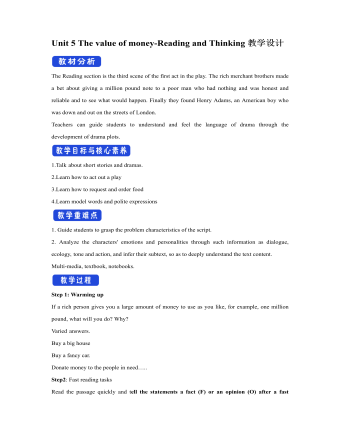
新人教版高中英语必修3Unit 5 The value of money-Reading and Thinking教学设计二
? Could you offer me some kind of work here?? I don’t want your charity, I just want an honest job.? Careless: I landed in Britain by accident.Step 7:Consolidation.? Find Henry? Roderick and Oliver were I .making a bet when they saw Henry, a poor young man. ? Know Henry? About a month ago, Henry was sailing and later he found himself carried out to sea by a strong wind. Fortunately, he 2.was spotted by a ship. And it was the ship that brought him to 3.England? Offer money to Henry ? Oliver and Roderick gave Henry a letter and told him that there was money in it. They 4.persuaded him to accept it, and made him 5.promise that it wouldn't be opened until 2 o'clock.Step 8:Language pointsa large amount of: a large quantity of; a great deal ofe.g. They bought a large amount of furniture before they moved their new house.make a bet: make an arrangement to risk money, etc. on an event of which the result is doubtful.e.g. We made a bet on the result of the match.permit sb to do something: allow somebody to do somethinge.g. My mother doesn’t permit me to ride in the street after it rained.by accident: as a result of chancee.g. I only found it by accident.stare at: look at somebody or something with the eyes wide open in a fixed gaze( in astonishment, wonder, fear, etc)to be honest: to tell you the truth; to be franke.g. To be honest, I don’t think we have a chance of winning.Step7 Homework:What do you think will happen to Henry? Will the bank-note help him or get him into trouble?
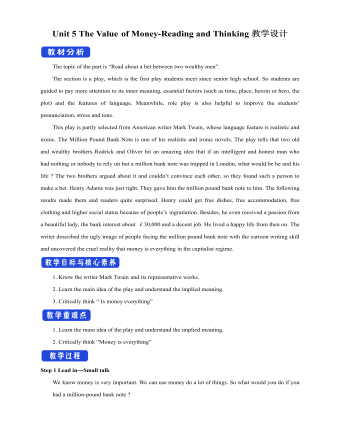
新人教版高中英语必修3Unit 5 The Value of Money-Reading and Thinking教学设计一
Everybody wants to get wealth.In today’s material world,making money or becoming wealthy symbolizes a person’s success and capability. Many people just make every effort, pay any price to attain greater wealth. With money,they can buy nice, large apartments in nice neighborhood. With money they can own luxurious cars. Wealth seems to bring all happiness in life.But is wealth the only road to happiness? Not really. There are many things in the world, which are beyond the means of money, such as friendship, love, health and knowledge. People are so preoccupied with struggling for money that they have no time or would not take the time to form or maintain friendship. What happiness can they feel living as lonely miserable creatures without love or friends in the world even if they accumulate tremendous wealth?In my opinion, people can’t do anything without money, but money is not everything. What money will bring you depends on your personal belief and goal in life. If you are kind enough to help others, especially the poor, money is a good thing to you. With it, you can do much more for the benefit of people and your country, and it will add to your own happiness. If you want money just for your own needs, you’ll never be satisfied or happy. In a word,you should have money spent for more people. Only then can money be the source of your happiness.Step 8 Homework4 students in a group, one acts Roderick, one Oliver, one servant and the fourth one acts Henry Adams, then listen to the tape, pay more attention to the difference between American English and British English in pronunciation, stress, tone.
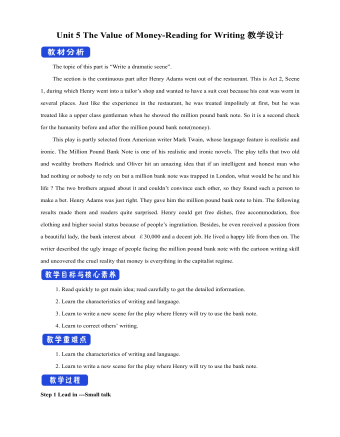
新人教版高中英语必修3Unit 5 The Value of Money-Reading for Writing教学设计二
2. 您能看到, 我头发太长了。You can see that my hair is much too long.3. 无论什么时候, 只要您想回来就回来。Please come back whenever you want.4. 您仅有很少的头发要理! You only have too little hair to cut !5. 为您服务是我的荣幸!It is my honour to serve you!Step 9 Writing(Henry is walking down the street when he sees a sign for a place that cuts hair. He decides to have it cut. )H=Henry B=BarberH: Good afternoon, I’d like to have my hair cut, if I may. (The barber looks at Henry’s hair and continues cutting another man’s hair. ) Er, I’d really like a haircut. As you can see it’s much too long. B: (in a rude manner) Yes, I can see that. Indeed, I can. H: Fine, well, I’ll have a seat then. (He sits in one of the barber’s chairs. The barber turns to look at Henry. )B: It’s quite expensive here, you know! Are you sure you can afford it?H: Yes. I think so. (After his hair is cut, the barber tells Henry how much he must pay. Henry shows the barber the bank note. )B: Why Mr. . . (looks shocked)H: Adams. Henry Adams. I’m sorry. I don’t have any change. B: Please don’t worry! (wearing a big smile) Nothing to worry about! Nothing at all! Please come back whenever you want, even if you only have too little hair to cut! It will be my honour to serve you!Step 10 Pair workExchange drafts with a partner. Use this checklist to help your partner revise his/her draft.1. Are all the elements of a play included and in good order ?2. Do the character use suitable language ?3. Are the stage directions clear and useful ?4. Is the plot clear and exciting enough ?
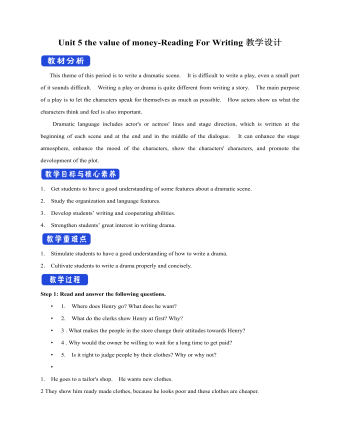
新人教版高中英语必修3Unit 5 the value of money-Reading For Writing教学设计一
【参考范文】Narrator:(Henry is smiling as he leaves the restaurant. As he is walking down the street, he sees a sign for a place that cuts hair. He decides to get it cut. )H=Henry;B=Barber;R=rude manH:Good afternoon, I'd like to get a cut, if I may. (The barber looks at Henry's hair and continues cutting another man's hair. )Er, I'd really like a haircut. As you can see it's much too long. B:(in a rude manner) Yes, I can see that. Indeed, I can. H:Fine, well I'll have a seat then. (He sits in one of the barber's chairs. The barber turns to look at Henry. )B:It's quite expensive here, you know!Are you sure you can afford it?H:Yes. I think so. (In comes the rude man. )R:Hey you there. I need a haircut quickly. Can you do me straightaway?B:All right, then, get in the chair and I'll see what I can do. R:Thank you. (sits down in one of the barber's chairs)H:Excuse me, but I was here first. Aren't you going to do my hair first?B:This man's in a hurry. H:Well so am I!I insist that you cut my hair first. B:OK, but I'll have to be quick. This gentleman is waiting. H:Thank you. (They both become quiet. After his hair is cut, the barber tells Henry how much he must pay. Henry shows the barber the bank note. )B:Why, Mr . . . (looks shocked)H:Adams. Henry Adams. I'm sorry, I don't have any change. R:You're that Mr Adams! Well,I'm glad I waited or I might never have known it was you. B:Why, Mr Adams, please don't worry!(wearing a big smile) Nothing to worry about!Nothing at all!Please come back any time, even if you only need too little hairs cut!It will be my honour to serve you!
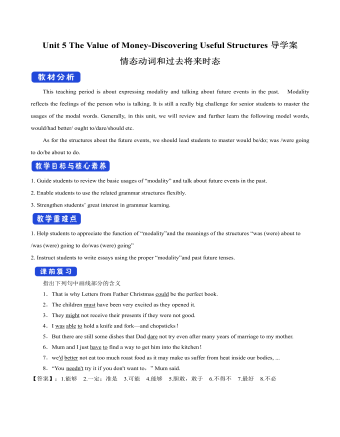
新人教版高中英语必修3Unit 5 The Value of Money-Discovering Useful Structures导学案
4.They were going to find someone to take part in their bet when they saw Henry walking on the street outside.[归纳]1.过去将来时的基本构成和用法过去将来时由“would+动词原形”构成,主要表示从过去某一时间来看将要发生的动作(尤其用于宾语从句中),还可以表示过去的动作习惯或倾向。Jeff knew he would be tired the next day.He promised that he would not open the letter until 2 o'clock.She said that she wouldn't do that again.2.表示过去将来时的其他表达法(1)was/were going to+动词原形:该结构有两个主要用法,一是表示过去的打算,二是表示在过去看来有迹象表明将要发生某事。I thought it was going to rain.(2)was/were to+动词原形:主要表示过去按计划或安排要做的事情。She said she was to get married next month.(3)was/were about to+动词原形:表示在过去看来即将要发生的动作,由于本身已含有“即将”的意味,所以不再与表示具体的将来时间状语连用。I was about to go to bed when the phone rang.(4)was/were+现在分词:表示在过去看来即将发生的动作,通常可用于该结构中的动词是come,go,leave,arrive,begin,start,stop,close,open,die,join,borrow,buy等瞬间动词。Jack said he was leaving tomorrow.
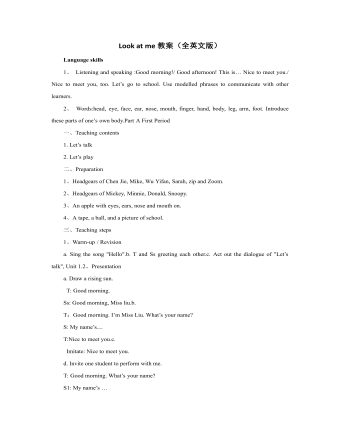
人教版新课标PEP小学英语三年级上册Look at me教案(全英文版)
3、Practicea. Nice to meet you. Nice to meet you,too.b. Perform the dialogue.c. Arrange the dialogue according to the pictures or sentence cards.d. Let’s play.A: Good afternoon,B. This is C. Hello, C! Nice to meet you.C: Nice to meet you, too.A,B: Goodbye!C: Bye!4、Assessment Workbook page 10Add-activitiesa. Listen to the recording and repeat.b. Make a dialogue according to "Let’s talk".Second Period一、Teaching contents1. Let’s learn Words:body, leg, arm, hand, finger, foot.1. Let’s do二、Preparation1、a puppet2、Cards of body, leg, arm, hand, finger and foot.3、headgear of a captain三、Teaching steps1、Warm-up/ Revisiona. Captain says to review "let’s do" of Part A.b. Perform the students their own dialogues.2、Presentationa. Learn to say "body, leg, arm, hand, finger and foot."b. Listen to the recording and repeat.c. Let’s do. Clap your hands. Snap your fingers. Wave your arms. Cross your legs. Shake your body. Stamp your foot.3、Practicea. Let’s draw a person.b. Let’s do. Point out which picture.c. Let’s do. Who responses faster.4、Assessment Workbook page 115、Add-activitiesa. Listen to the recording, repeat and act out.b. Say all the names of the body to your parents.Third Period一、Teaching contents1. Let’s check2. Let’s chant二、Preparation1、stationeries1、pictures of parts of Zoom
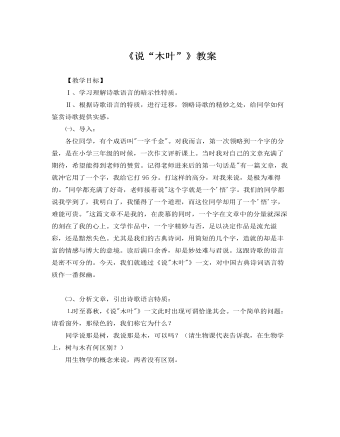
人教版高中语文必修5《说“木叶”》教案
【教学目标】Ⅰ、学习理解诗歌语言的暗示性特质。Ⅱ、根据诗歌语言的特质,进行迁移,领略诗歌的精妙之处,给同学如何鉴赏诗歌提供实感。㈠、导入:各位同学,有个成语叫"一字千金"。对我而言,第一次领略到一个字的分量,是在小学三年级的时候,一次作文评析课上。当时我对自己的文章充满了期待,希望能得到老师的赞赏。记得老师进来后的第一句话是"有一篇文章,我就冲它用了一个字,我给它打95分。打这样的高分,对我来说,是极为难得的。"同学都充满了好奇,老师接着说"这个字就是一个'悟'字。我们的同学都说我学到了,我明白了,我懂得了一个道理,而这位同学却用了一个'悟'字,难能可贵。"这篇文章不是我的,在羡慕的同时,一个字在文章中的分量就深深的刻在了我的心上。文学作品中,一个字精妙与否,足以决定作品是流光溢彩,还是黯然失色。尤其是我们的古典诗词,用简短的几个字,造就的却是丰富的情感与博大的意境。读后满口余香,却是妙处难与君说。这跟诗歌的语言是密不可分的。今天,我们就通过《说"木叶"》一文,对中国古典诗词语言特质作一番探幽。
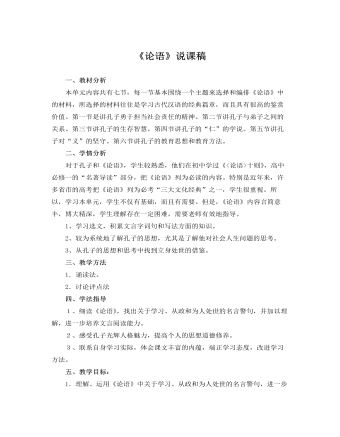
人教版高中语文必修1《论语》说课稿
三、文本中的句子解决完毕,大家对文本内容的理解更加深入了。请速度文本,思考:《论语》具体涉及了哪些方面的内容,体现了孔子什么观点?明确:主要有治学、从政、修身养性和交友治道等方面,体现了孔子“克己复礼”的思想。四、 教师引导学生讨论: 如何评价孔子的言行和观点?从古至今人们对孔子有哪些评价?明确:1、春秋战国时代, 孔子门人及其后学者均推尊孔子。门人中以子贡为代表,他对孔子赞美备至,奉如天人,把孔子比拟为高天、日月、木铎,凡人是永远不可企及的,认为孔子是天生的圣人,“仰之弥高,钻之弥坚”。亚圣孟子认为孔子所行的“圣人之道”是遍及自然界和社会的至高准则。然而当时民间一般看法认为孔子是博学成名的大学者。





















